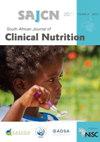Breakfast consumption and its relationship to sociodemographic and lifestyle factors of undergraduate students in the School of Health Sciences at the University of KwaZulu-Natal
IF 0.6
Q4 NUTRITION & DIETETICS
引用次数: 12
Abstract
Objectives: A study was undertaken to investigate breakfast consumption and the sociodemographic and lifestyle profile of undergraduate students in the School of Health Sciences at the University of KwaZulu-Natal (UKZN), and to determine if these factors are related to body mass index (BMI). Design: This was a cross-sectional, descriptive study. Setting: The venue for the study was the School of Health Sciences, UKZN, Westville campus. Methods: Data were collected in 2016, using a self-administered questionnaire, to obtain information on breakfast consumption and sociodemographic and lifestyle factors. Weight and height measurements were taken, using standardised procedures. Results: Of the 353 participants, 93% (n = 27) were between 17 and 22 years old, and 75.6% were female. First-year students made up 43.6% of the sample, with fewer students in the second (26.1%), third (20.1%) and fourth years (8.8%). Participants self-reported their health status to be very poor (1.1%), poor (4.0%), fair (27.5%), good (47.3%) and excellent (19.3%). Only 4.5% (n = 16) smoked and 24.4% (n = 86) consumed alcohol, while 58.4% were physically active. Breakfast was consumed by 80.5%; however, only 50.7% consumed it daily. Breakfast was consumed for its health benefits, to satisfy hunger, to keep alert, prevent fatigue, and keep up energy levels. Participants who lived at home, and whose parents or families bought the groceries, consumed breakfast daily, while more third-year students skipped breakfast. The most commonly consumed breakfast items were ready-to-eat cereals or instant cereals (60.1%), tea or coffee (50.4%), eggs (46.2%) and leftovers (32.0%). The BMI was higher among females, correlating positively with age and negatively with self-reported health status. There was no relationship between BMI and breakfast consumption and any other sociodemographic or lifestyle factors. Conclusion: Breakfast was consumed for its perceived health and well-being benefits. Barriers to consumption were a lack of time and lack of appetite. Given its health and nutritional benefits, regular breakfast consumption should be encouraged among university students.夸祖鲁-纳塔尔大学健康科学学院本科生早餐消费及其与社会人口学和生活方式因素的关系
目的:本研究旨在调查夸祖鲁-纳塔尔大学(UKZN)健康科学学院本科生的早餐消费、社会人口统计学和生活方式特征,并确定这些因素是否与体重指数(BMI)有关。设计:这是一项横断面描述性研究。环境:研究地点为健康科学学院,UKZN, Westville校区。方法:2016年收集数据,采用自填问卷,了解早餐消费情况及社会人口和生活方式因素。采用标准化程序测量体重和身高。结果:在353名参与者中,93% (n = 27)的年龄在17 - 22岁之间,75.6%为女性。一年级学生占样本的43.6%,二年级(26.1%)、三年级(20.1%)和四年级(8.8%)的学生较少。参与者自我报告的健康状况为非常差(1.1%)、差(4.0%)、一般(27.5%)、好(47.3%)和优(19.3%)。只有4.5% (n = 16)的人吸烟,24.4% (n = 86)的人饮酒,58.4%的人体育锻炼。吃早餐的占80.5%;然而,只有50.7%的人每天食用。吃早餐是为了它的健康益处,充饥,保持警觉,防止疲劳,并保持能量水平。住在家里、由父母或家人购买食品杂货的参与者每天吃早餐,而更多的三年级学生不吃早餐。最常食用的早餐食物是即食谷物或即食谷物(60.1%)、茶或咖啡(50.4%)、鸡蛋(46.2%)及剩菜(32.0%)。女性的身体质量指数较高,与年龄呈正相关,与自我报告的健康状况呈负相关。BMI和早餐消费以及任何其他社会人口统计学或生活方式因素之间没有关系。结论:人们吃早餐是为了健康和幸福。消费的障碍是缺乏时间和缺乏胃口。考虑到早餐对健康和营养的好处,应该鼓励大学生经常吃早餐。
本文章由计算机程序翻译,如有差异,请以英文原文为准。
求助全文
约1分钟内获得全文
求助全文
来源期刊

South African Journal of Clinical Nutrition
NUTRITION & DIETETICS-
CiteScore
2.50
自引率
9.10%
发文量
21
期刊介绍:
1.The Journal accepts articles from all basic and applied areas of dietetics and human nutrition, including clinical nutrition, community nutrition, food science, food policy, food service management, nutrition policy and public health nutrition. 2.The Journal has a broad interpretation of the field of nutrition and recognizes that there are many factors that determine nutritional status and that need to be the subject of scientific investigation and reported in the Journal. 3.The Journal seeks to serve a broad readership and to provide information that will be useful to the scientific community, the academic community, government and non-government stakeholders in the nutrition field, policy makers and industry.
 求助内容:
求助内容: 应助结果提醒方式:
应助结果提醒方式:


